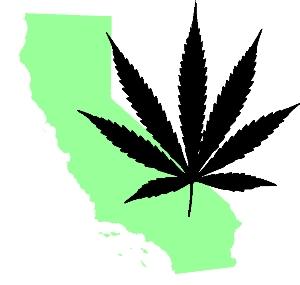California's Prop 19, the "tax and regulate" initiative to legalize marijuana, is ahead in the polls. But turnout is going to be key in this very close election. Please sign up to do get out the vote volunteering by phone -- you don't have to live in California, you just need a phone and an Internet connection -- or do other work to help put Prop 19 over the top.
It's less than a month before California votes on legalizing marijuana. The battle lines are drawn, but there are a few surprises. Stoners Against Prop 19? Say what?
There have been a baker's dozen polls on Prop 19, and while they have varied, the cumulative result is starting to smell like legal marijuana in California. But a poor turnout could turn all of that around, and as saying goes, there's only one poll that counts.
Some 288 people were killed in prohibition-related violence in Ciudad Juarez last month, and the pace is continuing this month.
Whew! Sex, drugs, strippers, and a federal judge, oh, my! Plus a murder-plotting meth-head trooper, another crooked border inspector, more Philly cops trying to rip off drug dealers, and an Oklahoma narc helping send guns down Mexico way.
As election day draws near, California's marijuana legalization initiative appears to be picking up voter support. It's now at 52% in one poll.
While getting busted for pot possession in California is only a $100 fine, it is still a misdemeanor. Or at least it was. Now it's going to be true decriminalization.
California Gov. Schwarzenegger could have made syringe sales to adults legal throughout the state in a bid to reduce the transmission of HIV and Hep C. Instead, he chose to extend a program leaving it up to cities and counties.
Colorado is drafting regulations for its growing medical marijuana industry, but some advocates think they're going overboard with the surveillance.
Plant disease -- not eradication -- reduced the supply of Afghan opium this year, but rising prices mean more farmers will plant next year, the UN warns.
In a bizarre denunciation of drug legalization, Peruvian President Alain Garcia warned legalizing pot would lead to euthanasia of the elderly and fascist barbarism.
The Polish government is cracking down on new synthetic drugs and wants the power to pull from the shelves any product that could be harmful to health or life. It didn't mention Polish vodka, though.
Opponents of Prop 19 heckled Richard Lee last weekend at a debate on the measure's merits. Surely we can do better than that.
Events and quotes of note from this week's drug policy events of years past.
Dear reformer:
The time is now. Polls show California's marijuana legalization initiative, Proposition 19, several points in the lead, but with voter turnout in this midterm election year being key -- see our latest report. There are important medical marijuana initiatives in Arizona, Oregon and South Dakota too. Whether you live in one of these states or not, there are ways that you can help:
Voter Registration. If you live in California, Oregon or South Dakota, but are not yet registered to vote, there is still time to register and be able to vote on one of these initiatives. And voting is important wherever you live, not just the initiative states -- see our
election coverage archive for a sense of just how much.
If you are not yet registered to vote, please visit our online 50-state voter registration tool to print out a form that you can mail or deliver to your election office. California and South Dakota have a registration deadline of October 18th, and Oregon's is October 12th! Please send this link to all your friends too.
Get Out the Vote Phone Calling. StoptheDrugWar.org has partnered with the "Just Say Now" campaign to enable any of our supporters who have telephones to do get out the vote work supporting Prop 19 or the other initiatives. Just take the following steps:
- Click here to sign up. You can use your Facebook or Twitter account, or register with an email address and password.
- Visit the StoptheDrugWar.org group page and click the "join" link in the center of the page.
- Watch the training video. (Video also appears below.)
- Visit the phonebank dashboard page, where you can click through to phone bank for any of those four states (between noon and 11:59pm EST). Select a state. Begin phone calling. (Make sure you've watched the training video.)
- Invite more people to join the effort.
Canvassing. If you live in one of the initiative states or can get there, you may be able to canvas door to door, you can put a sign up in your yard, there are other ways to help. Visit the campaigns' web sites to sign up: Arizona, California, Oregon, South Dakota. If you do canvassing in California, consider doing so as a StoptheDrugWar.org volunteer -- along with the campaign's materials, you would also bring email signup sheets recruiting for both our newsletter and the campaign (downloadable here).
Endorse the Initiative. If you are a prominent individual or a respected member of your community, your endorsement might be useful to the campaign. Please download the Prop 19 campaign's endorsement packet here -- bring it to other people whose names you think might help too. Send the last page of the packet (the endorsement form) to StoptheDrugWar.org's efax number, 1-202-355-0298. (We will forward it to the campaign, but we also want to know if you heard about it from us.) If you don't have access to a fax machine, mail it as soon as possible to the address listed on the form, or use the web page listed on the form to submit your endorsement.
THANK YOU FOR TAKING ACTION -- THE TIME IS NOW -- WE ARE ALL CALIFORNIANS!
Sincerely,

David Borden, Executive Director
StoptheDrugWar.org
P.O. Box 18402
Washington, DC 20036
P.S. Please visit our web site to make a donation of any size you can afford. Your support is what makes all of our work possible.
back to top
With election day now less than a month away, California's Proposition 19 tax and regulate marijuana legalization initiative is leading in most polls (although a Monday Reuters/Ipsos poll showing it losing by nine points sent a chill down the spines of supporters) and is well-positioned to make California the first entity anywhere to legalize marijuana. But what happens in the next 27 days is crucial, as proponents and opponents alike seek to come up with the votes to prevail.
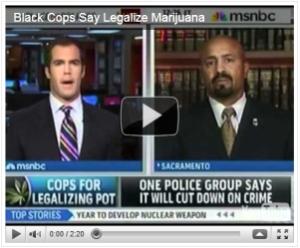
our side
The battle lines are drawn.
Lining up in support of Prop 19 are dozens of (mostly) retired law enforcement figures, including former San Jose Police Chief Joe McNamara and former Seattle Police Chief Norm Stamper, as well as Law Enforcement Against Prohibition and the National Black Police Association; four California US congressmen; dozens of state and local elected officials; local ACLU chapters; the California NAACP; the California Libertarian Party, the California Green Party; the California Young Democrats and many local Democratic groups; the Republican Liberty Caucus; organized labor groups, including the SEIU of California, the Western States UFCW, the longshoremen, and various union locals; clergy, including the California Council of Churches IMPACT and the Interfaith Drug Policy Initiative; economist Dr. Jeffrey Miron; and a number of physicians, including former US Surgeon General Joyce Elders. California's burgeoning professional cannabis community has moved Prop 19 forward, with supporters including the Harborside Health Center, the Berkeley Patients Group, and the initiative's primary sponsor, Oaksterdam's
Richard Lee.
On the other side are the usual suspects: The California Narcotics Officers' Association, the California Association of Highway Patrolmen, the California Police Chiefs Association, the California Correctional Supervisors Organization, the California Peace Officers Association, the California District Attorney Association, and local police associations. They are joined by all federal drug czars past and present, past and present DEA administrators, both California US senators and most of the congressional delegation, most newspaper editorial boards, the California Chamber of Commerce, Mothers Against Drunk Driving, the California Beer and Beverage Distributors (who chipped in $10,000 to
Public Safety First, a political action committee created to oppose Prop 19), Californians for a Drug-Free Youth, DARE America, and other anti-drug organizations.
But given marijuana's increasing popular acceptance, legalization foes aren't getting much traction anymore with "marijuana is the devil's drug" messages. Instead, they are forced into tangential attacks: Prop 19 will lead to more drugged driving; it will lead to workers high on the job, they say. It won't earn tax revenues because everyone will grow his own. It will create a "regulatory nightmare." Jacob Sullum at
Reason magazine and veteran expert activist and Prop 19 steering committee member Chris Conrad's
Prop 19 Fact Check and Rumor Control web page both do a thorough job of debunking those claims.
The opposition so far has been relatively low profile -- because it doesn't have any money. According to
campaign contribution data at the California Secretary of State's office, Public Safety First has only managed to raise $178,000 to oppose Prop 19 this year, and more significantly, only has $54,000 in the bank right now. That's not enough to bankroll any kind of media campaign in the nation's most populous state.
That's a change from the past, when foes of drug reform initiatives could count on big money from special interests, as was the case in 2008, when a sentencing reform initiative that appeared headed for victory went down in flames after a big injection of funds from the powerful and wealthy prison guards' union. This year, the prison guards and their pile of cash are sitting it out.
The Prop 19 campaign fervently hopes they continue to do just that. Its worst fear at this point is a last-minute negative advertising blitz, and there is still time for that to happen. That's because, like the opposition, Prop 19 is essentially broke. Although it has raised more than $700,000 this year, it only has $67,000 in the bank. An independent pro-Prop 19 group,
Students for Sensible Drug Policy (SSDP), has another $100,000 in the bank, thanks to surprise donations from
Dr. Bronner's Magic Soaps and the DC-area store
Capitol Hemp. SSDP is spending the money between now and Election Day on a Yes We Cannabis Fire Truck Tour doing voter registration and get-out-the-vote work on California campuses.
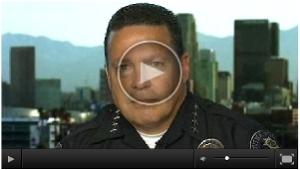
the other side
For the opposition, the lack of cash means it has to work to try to get its message out. Aside from the former drug czars coming out against the measure, a handful of debates, the penning of some op-eds, and a presence on the web, People First hasn't done much. It has held a handful of lackluster press conferences, which have generated some coverage, and spokesmen are always willing to give good quote when reporters call, but so far, that's about it.
Other than for the lack of cash, opposition from the usual suspects is pretty much as expected. What is surprising is the emergence of a vocal anti-Prop 19 movement with the marijuana community. From cannabis connoisseur Dragonfly de la Luz and her
Stoners Against Prop 19 to
Vote No on Prop 19, with its warning of a "Prop 19 cartel," to medical marijuana dispensary operators like HopeNet, the Green Door, and the California Cannabis Association, a fifth column within the marijuana movement is seeking to defeat Prop 19.
Their arguments, which can be read on their web sites, are varied, but boil down to a couple of main claims: that passage of Prop 19 will somehow hurt medical marijuana patients or dispensaries, and that Prop 19 is "not legalization" because it sets possession limits and allows for taxation and regulation of cultivation and distribution. There is an additional fillip of conspiracy-tinged fears that Prop 19 will lead to a corporate takeover of the pot industry. Left unspoken is the economic self-interest of growers and dispensary operators.
Those arguments have been heartily answered in detail by, among others, Chris Conrad (
here), national NORML outreach director Russ Bellville (
here). Those readers interested in the battle over clauses, intentions, and meanings can compare the two sets of sites and decide for themselves.
"They have said nothing we have not been able to disprove," said Conrad, "but it doesn't matter because they're not reality-based. They're like our own little Tea Party, with a politics of fear and conspiracy stuff, tangents about corporate takeovers, and libertarian anti-tax and anti-regulation notions."
"We want parity and equality, and that means if you sell something, you have to pay taxes," said Mikki Norris, Conrad's long-time partner in life and activism. "The anti-tax thing has inserted itself into every movement, including this one."
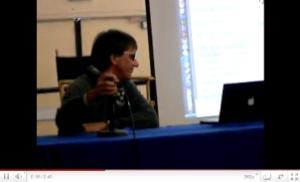
Richard Lee giving up on the presentation (but not the initiative)
Tensions boiled over during a debate last weekend at the Cow Palace in San Francisco during the
International Cannabis and Hemp Expo, a pot industry trade show. Medical marijuana entrepreneur Richard Lee, the primary motivating force behind Prop 19, was subjected to
loud heckling and shouting as he attempted to explain why pot people should vote for the initiative. A disgusted Lee finally rolled away in his wheelchair, leaving Conrad to carry on.
Nevertheless, Conrad sees the "Stoners Against Prop 19" types more as a distraction than as serious opposition. "I don't think they're that important, really," he said. "We have some serious opposition, and we're waiting for those ads to come out, we're waiting for the school bus full of children with the stoned driver. We're more worried about that kind of opposition in the works than we are by these people."
For Dale Gieringer, long-time head of
California NORML, opposition to Prop 19 inside the marijuana community is overstated, but could impact the election result in a tight race. "It's a tempest in a teapot, a minority of a minority," said Geiringer. "But this looks like it's going to be a very close election, so it's possible they could affect the outcome."
Despite the heated rhetoric and venom on display in recent weeks, both sides should treat each other with respect, he said. "There are too many people casting aspersions about others' intentions in this," Gieringer said. "There are good people on both sides of Prop 19. There are some very dedicated supporters of legal marijuana who simply do not like the wording of Prop 19 for one reason or another."
But not voting for Prop 19 is the wrong choice, said Gieringer. "Some will conscientiously not vote for something that's not to their taste, but I don't think that's a wise thing to do in a close election. This election is about do you favor legal marijuana or not, and all the other concerns can be adjusted afterward," he said.
"They don't want to pay taxes, they're afraid it opens things up to big business," said Gieringer. "Others think it doesn't go far enough, and there are medical marijuana people who are afraid this will somehow infringe on patients' rights under Prop 215 and Senate Bill 420. I don't agree with that analysis."
Neither does
Americans for Safe Access (ASA), the country's largest medical marijuana defense group, and one deeply rooted in the California medical marijuana scene. As a group concentrating on medical marijuana, ASA is neutral on Prop 19, but, in response to numerous questions from members and other interested observers, ASA has created a
Prop 19 FAQ on its web site.
"Does Prop 19 hurt patients?" was the question. "No. While it is possible there will be unanticipated consequences and legal controversy, nothing in the text of Proposition 19 is designed to deny any rights to medical cannabis patients," was ASA's answer.
"Does Prop 19 overrule the medical marijuana laws of California?" was the question. "No. Proposition 19 is designed to, among other things, '[p]rovide easier, safer access for patients who need cannabis for medical purposes.' Although a statement of purpose is not necessarily controlling, courts generally look to it in interpreting the statute's language. The purpose of Proposition 19 is not to overturn Proposition 215 or any other state or local medical cannabis law," was ASA's answer.
"Will Prop 19 allow localities to ban medical marijuana dispensaries?" was the question. "Unclear. Currently, there is no legal authority stating that localities must regulate dispensaries under Proposition 215 and SB 420. Proposition 19 allows for local regulation of medical cannabis sales, but also allows localities to ban such activity. If Proposition 19 is adopted, it is unclear how the courts will integrate both laws with respect to dispensaries," was ASA's answer.
It is worth noting that many California communities already ban dispensaries. Other, more medical marijuana friendly, locales regulate and tax them.
"People are concerned when voters are considering something so similar to a right already afforded them and that a new law might somehow restrict those rights," said ASA spokesman Kris Hermes. "There are many questions unanswered, especially around the issue of distribution. We're fighting right now to prevent local governments from adopting bans against distribution. Given that Prop 19 allows for wet and dry localities, and because we haven't completely ironed out the issue of whether local governments can ban medical marijuana distribution, this could infringe on those rights, especially if courts side with law enforcement against having a patchwork of different rules for different counties," Hermes said.
"There are also entrepreneurs who see their business being threatened by a huge influx of legal marijuana," said Hermes. "For some people, there is definitely a financial interest at stake, but ASA doesn't feel that should be a reason to oppose the initiative."
"What's not so clear is whether local governments might not have more power to tax, regulate, and potentially ban medical marijuana collectives," said CANORML's Gieringer. "The initiative gives very strong authority to local governments to do such things. It's not clear what their authority is now. Many patients feel that, under current law, local governments have to accept collectives and maybe dispensaries. My reading is that that is not required by Prop 215, but might arguably be required by SB 420. But SB 420 is a statute and can be changed by the legislature at any time. I wouldn’t be surprised if they start tinkering around next year regardless of Prop 19. But the stronger the vote Prop 19 gets, the stronger the position of both patients and other users next year."
On November 3, regardless of the intricacies of the arguments over Prop 19, the rest of the world is going to wake up to a headline from California. Is it going to be "California Legalizes Marijuana" or is it going to be "California Rejects Marijuana Legalization?" California voters have 27 days to decide.
back to top

four weeks to go!
California's
Proposition 19, the tax and regulate marijuana legalization initiative, is certainly the most talked about ballot measure in the land this year. It is just as certainly the most polled of any initiative this year.
No fewer than a baker's dozen polls have surveyed Golden State voters since May of this year, and at least one more will appear the weekend before election day. The average for all the polls so far has Prop 19 winning 47.4%, with 43.2% opposed and 9.4% undecided.
The numbers would have been better for Prop 19 except for Monday's Reuter/Ipsos poll, which bucked the trend to show Prop 19 losing by 10 points. It is one of only three polls that show the measure losing; one was a Field Poll in July and the other was another Reuters/Ipsos poll in June.
Here are the results of the 13 polls, beginning with the most recent:
While support for Prop 19 has been nearly unchanged in the last six months, as this
Talking Points Memo graph demonstrates, opposition has been declining and the gap between yes and no votes is growing--except in Monday's Reuters/Ipsis poll.
"What is remarkable is that the polls agree so closely," said Jay Leve, CEO of SurveyUSA. "Initiatives are among the most difficult things for pollsters to poll, because many of them are about arcane things that nobody knows about, like 30-year bond issues, so the polls can be all over the place. But in this one, the issue is pretty clear, and that's reflected in the agreement among the polls."
"Our surveys get more accurate the closer we get to election Day," said Mark DiCamillo, director of the Field Poll, which had Prop 19 trailing by four points in July, but leading by seven in September. "In our second survey, we were able to read voters the actual ballot question," he noted.
Field will be taking one more poll before the election, DiCamillo said. "We will release our final poll the weekend before the election," he announced. "It will be much more insightful."
But with less than a month to go, things are looking pretty good for Prop 19. Liberals, Democrats, and young voters consistently showed strong support for Prop 19 across all the polls, suggesting, somewhat paradoxically, that voters motivated by support for Prop 19 could help the campaigns of Democrats gubernatorial candidate Jerry Brown and Sen. Barbara Boxer, both of whom have come out in opposition to legalization. Likewise, if surging Brown and Boxer campaigns bring out Democratic and liberal voters, they are going to be likely to vote for Prop 19 despite the positions of their gubernatorial and senatorial candidates.
But Republicans, who oppose Prop 19 by margins of 2-1, are also counting on a massive turnout. If the primary is a reliable indicator, they could see just that. In 2008, Democrats made up 42% of the electorate and Republicans just 30%, but Republican enthusiasm this year could close that gap. In the primaries, where only 33% of the electorate voted, 44% of Republicans did, while only 32% of Democrats did. A strong GOP turnout combined with weak turnout among Democrats could spell doom for the measure.
If polling for some groups has been consistent, that hasn't been the case for others, especially black voters. For example, at one point, the Field Poll had Prop 19 losing by 12 points among black voters, while just weeks later Public Policy Polling had it up by 36 points. Black voters only account for 6% of the state's electorate, so the results may suffer from too small a sample size.
Pollster Nate Silver of
Fivethirtyeight.com had another possible explanation, one he called the "Broadus Effect," after one Calvin Broadus -- better known as the rapper and major pot aficionado, Snoop Dog. It's a variation on the "Bradley Effect," named for former Los Angeles Mayor Tom Bradley, who lost a mayoral race despite leading in the polls before election time.
The "Bradley Effect" posits that polls can be skewed by respondents who reply with what they think are the politically correct answers, rather than what they really think. Silver noted that automated robo-phone polls were showing higher support among blacks than polls done with human poll-takers.
"This might also explain why the split is larger among black and Hispanic voters," Silver wrote. "Marijuana usage is almost certainly more stigmatized when associated with minorities, and drug possession arrests occur much more frequently in minority communities. This is in spite of the fact that rates of marijuana consumption are only a smidgen higher among blacks than among whites, and are somewhat lower among Hispanics."
Pollsters are congenitally cautious about making predictions on actual election results, but both DiCamillo and Leve made heavily hedged predictions. "Usually, the burden of proof is on the proposition," said DiCamillo. "It's always on the yes side to make its case. In this case, there is a lead, but it's not quite at 50% plus one. Most initiatives do get a few percentage points out of the undecideds, so you'd expect this one to be favored for passage, but it's not a slam dunk."
Undecideds would have to break dramatically toward a no vote for the initiative to lose if the poll average today holds until Election Day. With Prop 19 at nearly 48% and undecideds at just under 10%, it would need to pick up just better than one out of five of those voters to get over the top.
And DiCamillo says Prop 19's prospects are good, barring some sort of October surprise. "If somebody came in and started advertising heavily against it, that could change things," he warned. So far, there's been no sign of that, but there is still time for a late TV ad campaign.
SurveyUSA's Leve was only a bit more definitive. "That it's maintaining a 10-point lead is good for the initiative, but that it's having trouble getting that 50% plus one is not," said Leve. "It's sort of a glass half full thing. If I was in Las Vegas and I was a betting man, I'd bet on it to win," said Leve. "But I'd only bet money I could afford to lose."
With less than a month out Prop 19 is leading by an average of more than four points. A historic victory for marijuana legalization may be coming into view, but Election Day will be a nailbiter, and its going to depend on turnout and those undecideds.
back to top
by Bernd Debusmann, Jr.
Mexican drug trafficking organizations make billions each year smuggling drugs into the United States, profiting enormously from the prohibitionist drug policies of the US government. Since Mexican president Felipe Calderon took office in December 2006 and called the armed forces into the fight against the so-called cartels, prohibition-related violence has killed more than 28,000 people, the government reported in August. The increasing militarization of the drug war and the arrest of dozens of high-profile drug traffickers have failed to stem the flow of drugs -- or the violence -- whatsoever. The Merida initiative, which provides $1.4 billion over three years for the US to assist the Mexican government with training, equipment and intelligence, has so far failed to make a difference. Here are a few of the latest developments in Mexico's drug war.

Ciudad Juarez
On Texas's Falcon Lake, which straddles the US-Mexico border,
an American couple was attacked as they rode a jet ski on the American side of the lake. Tiffany Hartley, 29, said that her and her husband David were chased and shot at by armed men coming from the Mexican side of the lake. David was shot in the head and left in the water, and is presumed dead. There have been several previous incidents of armed men on the lake, in some instances wearing Mexican police uniforms and shaking down fishermen.
In Ciudad Juarez,
eleven people were murdered. This brings the total number of homicides during the month of September to 288, 44 of them women. As of September 30, approximately 2,324 murders have been committed in Ciudad Juarez.
In Acapulco,
22 Mexican tourists from Michoacan were kidnapped and remain missing. The motives remain unclear, although it should be noted that none of the kidnapped men was a known drug trafficker and it appears they were mostly mechanics and carpenters.
Saturday, October 2
Across Mexico,
at least 34 people were killed during a 48-hour period. In the isolated Durango town of San Jose de La Cruz, a firefight between rival drug traffickers left fourteen dead. Much of Durango has traditionally been under the control of the Sinaloa Cartel, led by Joaquin "El Chapo" Guzman.
Sunday, October 3
In Guadalupe, near Monterrey,
15 people were killed after a suspected grenade attack on the town’s main plaza. Six children, including a three-year old, were among the wounded. It was the fourth attack with an explosive device in the Monterrey area in two days. On Friday, grenade attacks were reported outside a prison, the US consulate, and a federal court.
Tuesday, October 5
In Ciudad Juarez,
14 people were killed across the city. In one incident, a wounded man attempted to hide inside a restaurant, only to be discovered by the gunmen who were chasing him and shot dead in front of many patrons. Some were seen to have bloodstains on their clothing from the incident. 23 killings were reported in Juarez in the first 3 days of October.
Total Body Count for the Week: 153
Total Body Count for the Year: 8,305
Read the previous Mexico Drug War Update here.back to top
Whew! Sex, drugs, strippers, and a federal judge, oh, my! Plus a murder-plotting meth-head trooper, another crooked border inspector, more Philly cops trying to rip off drug dealers, and an Oklahoma narc helping send guns down Mexico way.
We don't typically mention cases of drug use (or paying for sex) in this feature, but when it's a federal judge cavorting like a degenerate rock star, we think it's worth noting. In between coke-fueled trysts, this guy was hearing drug cases. That said, let's get to it:
In Atlanta, a federal judge was arrested last Friday on charges he bought and used drugs with an Atlanta stripper with whom he was having a sexual relationship. Senior US District Judge Jack Camp Jr., 67, is accused of buying and using cocaine, marijuana, hydrocodone, and roxydocone as he partied with the exotic dancer. When FBI agents arrested him, they found two illegal firearms and a bag containing blue pills and a white powder in his car. He has been released on a $50,000 unsecured bond. Camp went down because the stripper was also an FBI snitch who became cooperative with the feds after a drug conviction. The pair met on multiple occasions to get high and get down, with Camp typically (although not always) providing the money and the stripper providing the sex and drugs. She recorded Camp talking about the drug deals.
In San Diego, a border inspector was arrested last Thursday for allegedly taking bribes to allow illegal immigrants and nearly five tons of pot to make it through the San Ysidro and Otay Mesas border crossings. US Customs and Border Patrol Officer Lorne Leslie Jones is charged with conspiracy to distribute marijuana, bribery, and immigrant smuggling. He faces 10 years on the first count and five years each on the latter two.
In Philadelphia, two Philadelphia police officers were arrested Monday for robbing a drug dealer, except, unfortunately for them, the drug dealer was actually an undercover officer working a sting. Officers Sean Alivera, 31, and Christopher Luciano, 23, are charged with robbery, false imprisonment, and related charges. At least five Philadelphia officers have been charged or convicted of trying to rip off drug dealers in the past year.
In Auburn, California, a former California Highway Patrol officer pleaded no contest Monday to methamphetamine and attempted murder charges. Ruben Salgado, a 12-year CHP veteran, had been arrested in May after buying meth from an informant and was arrested again in June after trying to hire someone to kill the snitch. In a plea deal, he copped to attempted murder, driving under the influence of meth, and meth possession while carrying a gun. He was sentenced to three years in prison.
In Oklahoma City, a former state narcotics officer pleaded guilty September 29 to federal charges in a gun-running ring where some of the weapons ended up in Mexico. Former Oklahoma Bureau of Narcotics and Dangerous Drugs Agent Francisco Javier Reyes admitted taking money to buy "military-type" rifles in Oklahoma for a Mexican national and paying two friends to purchase rifles for him. He pleaded guilty to one count each of conspiracy and transferring firearms to an out-of-state resident. Each crime carries a maximum penalty of five years in prison and a $250,000 fine. He's out on bail awaiting sentencing.
back to top
Proposition 19, California's "tax and regulate" marijuana legalization initiative, is winning, according to the latest poll results. A Public Policy Institute of California poll released Thursday had support for Prop 19 at 52%, with 41% opposed and 7% undecided.
Prop 19 would legalize the possession of up to an ounce of marijuana and the cultivation of up to 25 square feet of marijuana by adults over 21. It would also allow counties or municipalities the local option of allowing a taxed and regulated marijuana commerce. It would not affect California's medical marijuana law.
The survey question asked: "Proposition 19 is called the 'Legalizes Marijuana Under California but Not Federal Law. Permits Local Governments to Regulate and Tax Commercial Production, Distribution, and Sale of Marijuana. Initiative Statute.' If the election were held today, would you vote yes or no on Proposition 19?"
The survey was conducted by telephone (both land lines and cell phones) with 2,004 adult California residents in English or Spanish. It has a margin of error of +/-3%.
The poll is in line with most recent polls, which show the initiative leading by a few points. It is also noteworthy for showing support levels above 50%, something Prop 19 has had trouble doing in most other polls.
The poll suggests a strong correlation between political affiliation and support or opposition to the initiative. Strong majorities of Democrats (63%) and independents (65%) support the measure, while a strong majority of Republicans (62%) oppose it.
While that correlation has been fairly consistent among recent polls, this poll found a high level of support for Prop 19 among Hispanics (63%) than the other polls, most of which had Hispanic support at under 50%. The poll had support among whites at 50% and didn't ask about blacks, who make up only 6% of the California electorate.
As in other recent polls, majorities in the San Francisco Bay Area and the Los Angeles area support Prop 19, while a majority in the Central Valley does not. Young adults (70%) support Prop 19, while those over 35 are split.
California may legalize marijuana on November 2. But the vote is going to be close, so if you're a Californian please get to California's polls, and tell everyone you know in California who might support this to do so too.
back to top
California Gov. Arnold Schwarzenegger (R) Thursday signed into law a bill that decriminalizes the possession of up to one ounce of marijuana. The bill reduces simple possession from a misdemeanor to an infraction.
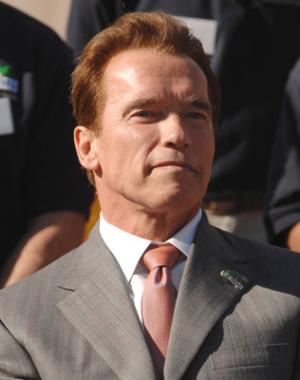
schwarzenegger.jpg
Currently, small-time pot possession is "semi-decriminalized" in California. There is no possible jail sentence and a maximum $100 fine. But because possession is a misdemeanor, people caught with pot are "arrested," even if that means only they are served a notice to appear, and they must appear before a court.
That has happened to more than a half million Californians in the last decade, and more than 60,000 last year alone. Every one of them required a court appearance, complete with judge and prosecutor. That costs the cash-strapped state money it desperately needs.
Under the bill signed today,
SB 1449, by Sen. Mark Leno (D-San Francisco), marijuana possession will be treated like a traffic ticket. The fine will remain at $100, and there will be no arrest record.
In a
signing statement, Schwarzenegger said he opposed decriminalization for personal use -- and threw in a gratuitous jab at
Proposition 19, the tax and regulate marijuana legalization initiative -- but that the state couldn't afford the status quo.
"I am signing this measure because possession of less than an ounce of marijuana is an infraction in everything but name," said Schwarzenegger. "The only difference is that because it is a misdemeanor, a criminal defendant is entitled to a jury trial and a defense attorney. In this time of drastic budget cuts, prosecutors, defense attorneys, law enforcement, and the courts cannot afford to expend limited resources prosecuting a crime that carries the same punishment as a traffic ticket."
"Gov. Schwarzenegger deserves credit for sparing the state's taxpayers the cost of prosecuting minor pot offenders," said
California NORML director Dale Gieringer. "Californians increasingly recognize that the war on marijuana is a waste of law enforcement resources."
The law goes into effect January 1. Even if Prop 19 passes in November, it leaves in place misdemeanor charges for smoking in public or in the presence of minors. Those misdemeanors would become infractions under the new law.
back to top
Gov. Arnold Schwarzenegger (R) last Thursday vetoed a bill that would have allowed pharmacies all over California sell syringes to adults without a prescription. The bill was touted by health experts as a key step in reducing the transmission of HIV/AIDS, hepatitis, and other blood-borne diseases.

mobile needle exchange/clinic site, Fresno
The state Department of Public Health estimates that approximately 3,000 California residents contract hepatitis C through syringe sharing every year and another 750 cases of HIV are caused by syringe sharing. Sharing dirty needles is the leading cause of new hepatitis C infections in the state and the second leading cause of new HIV infections.
"When I signed legislation my first year in office allowing for a pilot program to allow the sale of syringes through participating counties and registered pharmacies, I was seeking to balance the competing public health, law enforcement and local control issues that this issue requires," the governor wrote in his
veto message. "I believe this balance was achieved and
SB 1029 would remove the ability of local officials to best determine policies in their jurisdiction. Some counties have not sought to implement this pilot program, citing competing priorities, lack of pharmacy interest and law enforcement opposition. I respect these local decisions and while I appreciate the author’s hard work and dedication to this issue, I cannot sign this bill," Schwarzenegger wrote.
Instead, Schwarzenegger signed
AB 1701, which extends the existing Disease Prevention Demonstration Project for another eight years. That gives cities and counties the option of opting out of the program and not allowing syringe sales without a prescription.
The veto angered SB 1029 author Sen. Leland Yee (D-San Francisco), who in a statement last Friday said Schwarzenegger apparently "was not interested in an effective public health measure that would reduce health care costs to taxpayers. Not only did he ignore the recommendation of doctors and other health experts, but he ignored the fact that HIV-AIDS and hepatitis do not recognize county borders. Such epidemics are certain to continue without implementing these comprehensive strategies."
SB 1029's approach "has been evaluated extensively throughout the world and has been found to significantly reduce rates of HIV and hepatitis without contributing to any increase in drug use, drug injection, crime or unsafe discard of syringes," Yee continued. "In fact, there is not one credible study that refutes these findings. The governor’s veto is a moral and fiscal dilemma."
The veto was "tragic and infuriating," said Laura Thomas of the
Drug Policy Alliance, which supported Yee's bill. "It is an irrational attachment to drug war hysteria, at the expense of human life and fiscal responsibility to the California taxpayer," she said. "Nothing would have worked better and cost less in reducing the spread of HIV and hepatitis C than SB 1029."
back to top
Colorado is proposing to enact a medical marijuana tracking system in which everything from marijuana grows to patient purchases to the manufacture of pot brownies would be under constant remote video surveillance where agents could monitor it all. The proposal is giving medical marijuana advocates the creeps.
The proposal comes in the form of
draft regulations promulgated by the Department of Revenue's new Medical Marijuana Enforcement Division. The division was created by legislation passed this year and signed by Gov. Bill Ritter (D) on June 7. Its purpose is to strengthen oversight over Colorado's growing medical marijuana industry.
The system would be the first in the country to track medical marijuana "from seed to sell," Julie Postlethwait, a spokeswoman for the division told the
Denver Channel. The goal would be to prevent people using forged medical marijuana cards and to quickly track down pot contaminated with mold or marijuana food protects that are tainted. "We want to protect the patient. This is medicine," Postlethwait said.
"This in the long run legitimizes and helps the industry," she added. "They're caregivers. They want to provide the best quality medicine out there."
But medical marijuana advocates criticized the proposal as costly and overly intrusive.
"There is no conceivable justification for this system," said Robert Chase, a leader of the Colorado Coalition for Patients and Caregivers. "It goes beyond the systems that we use to control opiate narcotic drugs, which are demonstrably much, much more dangerous. There are valid concerns about the Big Brother issue," Chase said.
Chase pointed to other provisions in the draft proposal requiring medical marijuana to be transported in tamper-proof containers and to make growers and dispensary employees provide fingerprints at each step in the supply chain.
"It's a highly intrusive process of having to give fingerprints and being under constant video surveillance. It invokes George Orwell's '1984,'" Chase said. "The whole thing is preposterous," he said.
The draft regulations are not a done deal; indeed, they are very much a work in progress. The division has formed a working group of medical marijuana growers, providers, caregivers, patients, doctors, and law enforcement to continue to work on the draft rules.
The Medical Marijuana Work Group will hold hearings on October 4 and 21 in Lakewood. The public can attend, but not address, those hearings.
back to top

opium poppies (incised papaver specimens)
Although the extent of opium poppy cultivation in Afghanistan remained unchanged from last year, opium production declined by nearly half, thanks largely to a plant disease that affected poppy fields, the
UN Office on Drugs and Crime (UNODC) reported Thursday. But that means rising prices could provoke an increase in cultivation, UNODC warned in the executive summary of its
2010 Afghanistan Opium Survey. The full report will be released later this year.
"This is good news but there is no room for false optimism; the market may again become lucrative for poppy-crop growers so we have to monitor the situation closely," said Yuri Fedotov, new executive director of UNODC.
Afghanistan produces more than 90% of the world's opium, the raw ingredient used to make heroin. Production of the illicit crop is centered in southern Helmand and Kandahar provinces, home base of the Taliban insurgents. Profits from the opium trade fund the Taliban to the tune of an estimated hundred millions of dollars each year.
UNODC said slightly more than 300,000 acres were planted with poppy this year, about the same as last year after declines the two previous years. But because of the plant disease, opium production was estimated at 3,600 metric tons, down 48% from 2009.
The disease is likely spurring opium price increases, UNODC said. Prices declined from 2005 to 2009 as production boomed and stockpiles soared, but now the price is shooting up. Last year, farmers could expect to get $64 per kilogram of opium; this year, the price has nearly tripled, to $169 per kilo.
The stability in poppy cultivation comes despite years of efforts and billions of dollars invested in suppressing the trade. The US spent $250 million on anti-drug efforts in Afghanistan this year alone, according to the State Department's Office of International Narcotics and Law Enforcement (or "drugs and thugs," as Foggy Bottom wits like to call it).
Fedetov, a veteran Russian diplomat who took over the reins of UNODC earlier this year and whose home country is confronting high levels of heroin addiction, said a broader strategy was needed to end Afghan poppy planting. "As long as demand drives this market, there will always be another farmer to replace one we convince to stop cultivating, and another trafficker to replace one we catch," he said.
back to top
Peruvian President Alan GarcÃa said Monday he is absolutely opposed to drug legalization and warned that legalizing marijuana will take society down the path toward euthanizing the elderly. He vowed a constant fight "on all fronts" against drug use and the drug trade.
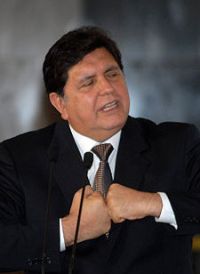
Alan
Peru is now the world's leading producer of coca, from which cocaine is made. In recent weeks,
GarcÃa has angled for a larger share of US drug-fighting dollars. The stimulating herb has been used as an energy booster and hunger suppressor since time immemorial in the Andean region.
GarcÃa said Monday that his anti-drug efforts will focus on eradication and alternative crops, as well as interdiction and money-laundering. A reinvigorated eradication campaign has already led to renewed strife in the countryside, where tens of thousands of peasant families make a living from coca. Two weeks ago, hundreds of
coca growers seized a hydroelectric plant in Ucayali province and blocked highways in the region to protest eradication efforts. Police later regained control of the plant, but the region remains restive.
"The Peruvian government has a firm position: I am absolutely against the drug legalization," GarcÃa said after opening the 20th meeting of the Heads of National Drug Law Enforcement Agencies (HONLEA) of Latin America and the Caribbean. Human beings "cannot kneel before their own powerlessness," he said.
"I think this (drug legalization) is like opening the way for the degradation of human beings, because if we legalize marijuana as a soft drug then we will legalize cocaine as hard drugs, and finally we will also legalize the elimination of the elderly, as in the old societies, because they can no longer contribute to the production," he said.
GarcÃa added that his government's position is firm and will not change before he leaves office next July "even though those who raise the flag of the drug legalization are very intelligent and well-known and noisy." He said he will always oppose advocates of ending drug prohibition because "they represent, without knowing it, the backward step of the human being in his path to freedom, which is basically the way of his conscience, i.e. to use his skills without escapes through drugs."
Not only will drug legalization lead to killing grandma, GarcÃa said, it will lead mankind down a death spiral to "fascist barbarism" and genocide.
GarcÃa's sentiments put him out of step with a region that is increasingly amenable to ending the decades long war on drugs. Former heads of state from Columbia, Brazil, and Mexico have called for an end to the drug war, while Argentina, Brazil, and Mexico have depenalized simple drug possession.
back to top
The Polish government announced Monday that it has shut down around a thousand stores that sold newly-emerging synthetic drugs, such as mephedrone and preparations containing synthetic cannabinoids (marketed under names like Spice and K2 in the US). It is also moving to amend its drug laws to cover such substances.

Royal Castle Square, Warsaw
"The state will not flinch when it comes to using all legal means available in the struggle against these substances," Justice Minister Krzysztof Kwiatkowski
told reporters Monday. "This is going to be a long and difficult fight because our opponent is extremely well-prepared, rich and determined," said Kwiatkowski.
The synthetic drugs have made headlines in Poland in recent weeks, with several users being hospitalized. There have also been a handful of deaths that have been attributed to the synthetics, though the actual connection between use of the substances and the deaths remains unclear.
In an operation beginning last week, police and health inspectors sealed the doors of stores selling the drugs. But that was just the beginning, Kwiatkowski said. He said the government would enact legislation to plug loopholes in the existing drug law, including adding a three-year prison sentence for anyone who supplies minors with a substance posing a risk to their health or life. Another proposed amendment would allow health inspectors to pull from the shelves for up to 18 months any substance suspected of being harmful.
It won't be without a fight. The owner of a chain of shops selling the new synthetics told the newspaper Polska he planned to sue over the state's closure of his shops.
More than a dozen US states and numerous municipalities have banned K2 and Spice, but it remains legal under federal drug laws.
back to top
Tensions within California's marijuana community over Proposition 19, the tax and regulate marijuana legalization initiative, boiled over at last weekend's debates between supporters and opponents at the Cow Palace in San Francisco during the International Cannabis and Hemp Expo, a pot industry trade show.
The measure has garnered some loud opposition in the marijuana community, though the true extent of the opposition is unclear. Some medical marijuana providers are opposing it, arguing that it endangers the rights of patients, but raising the question of whether what is really being endangered is those providers' profits. [Ed: The proposition contains language which unambiguously protects patients.] Some growers are opposing it, for largely self-interested reasons. And some consumers are opposing it, arguing that it isn't good enough, they might have to pay taxes, and it would lead to the corporatization of cannabis.
That has excited a harsh response, not just from the Prop 19 campaign, but also from national marijuana reform organizations. NORML deputy director Paul Armentano likened self-styled Stoners Against Prop 19 to a fringe element and compared their refusal to acknowledge facts with that of the Obama birthers, while NORML outreach director Russ Bellville drafted a line-by-line analysis of the initiative to refute the critics. Cannabis expert and campaign spokesman Chris Conrad has published a Prop 19 Fact Check, and an addendum addressing what he calls Prop 19 conspiracy theories and their authors.
[Editor's Note: Look for a feature article in the next few days examining the claims and the forces aligned for and against Prop 19.]
Medical marijuana entrepreneur Richard Lee, the primary motivating force behind Prop 19, was subjected to loud heckling and shouting as he attempted to explain why pot people should vote for the initiative, which is holding onto a not-so-comfortable lead in polls heading up to the election now a month away. A disgusted Lee then rolled away in his wheelchair, leaving campaign spokesman and cannabis expert Chris Conrad to carry on.
back to top
October 8, 1932: The Uniform State Narcotics Act is passed, endorsed by the federal Bureau of Narcotics as an alternative to federal laws. By 1937 every state prohibits marijuana use.
October 12, 1984: The Comprehensive Crime Control Act becomes law, establishing federal "mandatory minimum" sentencing guidelines eliminating judges' discretion when handing down prison terms. Over the next two years drug sentences increase by 71% nationwide.
October 7, 1989: Former US Secretary of State George P. Shultz tells an alumni gathering at Stanford Business School, "It seems to me we're not really going to get anywhere until we can take the criminality out of the drug business and the incentives for criminality out of it. Frankly, the only way I can think of to accomplish this is to make it possible for addicts to buy drugs at some regulated place at a price that approximates their cost... We need at least to consider and examine forms of controlled legalization of drugs... No politician wants to say what I have just said, not for a minute."
October 13, 1999: In a series of raids named "Operation Millennium," law enforcement in Mexico, Colombia, and Ecuador arrest 31 persons for drug trafficking, including Colombian cartel leader Fabio Ochoa. Ochoa is indicted in a Ft. Lauderdale court for importing cocaine into the US, which requests his extradition in December 1999.
October 13, 1999: Governor of New Mexico Gary Johnson is quoted by the Boston Globe: "Make drugs a controlled substance like alcohol. Legalize it, control it, regulate it, tax it. If you legalize it, we might actually have a healthier society."
October 9, 2000: PBS begins a special two-day program entitled "Drug Wars." The series examines America's ceaseless efforts over the past three decades to stop the flow of illegal drugs into the country, and shows how the drug war wastes hundreds of billions of dollars, alters the criminal justice system, puts millions of people in jail, and allows organized crime to thrive.
October 10, 2002: Drug Czar John Walters travels to Las Vegas, Nevada and begins two days of making appearances around the state illegally lobbying against Question 9, a proposal to amend the state constitution by making the possession of three ounces or less of marijuana legal for adults. The measure is defeated at the polls the following month.
October 7, 2003: Comedian Tommy Chong begins a nine-month federal prison sentence for operating a glass blowing shop that sold pipes to marijuana smokers.
back to top






